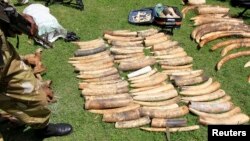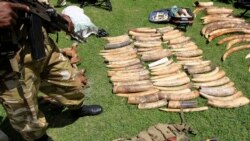Poaching and illicit trafficking in wildlife and other natural resources is big business, worth billions of dollars. More and more, it is conducted by sophisticated transnational organized crime syndicates and even some terrorist networks, posing an increasingly serious threat to international security. For that reason, the United Nations took up the issue last April, during the 22nd session of the UN Commission on Crime Prevention and Criminal Justice.
“Just one year later, we have seen significant progress in confronting the challenge of illegal trafficking in wildlife,” said U.S. Deputy Assistant Secretary for International Narcotics and Law Enforcement Affairs Todd Robinson. As an example, he cited a number of actions taken by the United States.
President Barack Obama released the United States’ National Strategy to Combat Wildlife Trafficking with three key pillars: reducing demand for illegally traded wildlife, strengthening domestic and global law enforcement, and building international cooperation.
To create a near complete ban on the commercial sale of elephant ivory, the United States closed a number of loopholes in U.S. law. For example, the burden of proof regarding the legality of ivory shifts from the government to the ivory holder.
Last November, Secretary of State John Kerry announced the State Department’s first-ever reward offer for information leading to the dismantling of a transnational criminal network. The Department of State is offering up to one million dollars for the Xaysavang Network: a transnational crime syndicate.
Further, the United States and Norway co-sponsored a resolution to encourage Member States of the United Nations to treat illicit trafficking in forest products, including timber, as a serious crime, thereby unlocking the international cooperation provisions of the UN Convention against Transnational Organized Crime.
The resolution, co-sponsored by a dozen countries, was just adopted during the 23rd session of the Commission on Crime Prevention and Criminal Justice, in May 2014. The resolution highlights the connection among corruption, transnational organized crime, and money laundering in the trafficking of timber and encourages international cooperation to counter trafficking in forest products, including cross-border information sharing and investigative efforts.
“Much work still needs to be done, and the trafficking in threatened and endangered species remains a crisis that needs urgent attention from all governments,” said Deputy Assistant Secretary Todd Robinson.
Nonetheless, “the United States is encouraged by how many governments have taken action on this issue since we last met, and by the spirit of cooperation among countries to reduce demand for these illegal products and prosecute the organized criminal networks involved.”
“Just one year later, we have seen significant progress in confronting the challenge of illegal trafficking in wildlife,” said U.S. Deputy Assistant Secretary for International Narcotics and Law Enforcement Affairs Todd Robinson. As an example, he cited a number of actions taken by the United States.
President Barack Obama released the United States’ National Strategy to Combat Wildlife Trafficking with three key pillars: reducing demand for illegally traded wildlife, strengthening domestic and global law enforcement, and building international cooperation.
To create a near complete ban on the commercial sale of elephant ivory, the United States closed a number of loopholes in U.S. law. For example, the burden of proof regarding the legality of ivory shifts from the government to the ivory holder.
Last November, Secretary of State John Kerry announced the State Department’s first-ever reward offer for information leading to the dismantling of a transnational criminal network. The Department of State is offering up to one million dollars for the Xaysavang Network: a transnational crime syndicate.
Further, the United States and Norway co-sponsored a resolution to encourage Member States of the United Nations to treat illicit trafficking in forest products, including timber, as a serious crime, thereby unlocking the international cooperation provisions of the UN Convention against Transnational Organized Crime.
The resolution, co-sponsored by a dozen countries, was just adopted during the 23rd session of the Commission on Crime Prevention and Criminal Justice, in May 2014. The resolution highlights the connection among corruption, transnational organized crime, and money laundering in the trafficking of timber and encourages international cooperation to counter trafficking in forest products, including cross-border information sharing and investigative efforts.
“Much work still needs to be done, and the trafficking in threatened and endangered species remains a crisis that needs urgent attention from all governments,” said Deputy Assistant Secretary Todd Robinson.
Nonetheless, “the United States is encouraged by how many governments have taken action on this issue since we last met, and by the spirit of cooperation among countries to reduce demand for these illegal products and prosecute the organized criminal networks involved.”






